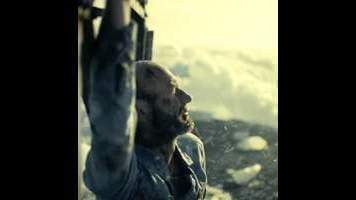Fortitude: “Episode 11”

When The Twilight Zone episode “The Monsters Are Due On Maple Street” aired just over 55 years ago, the revelation that the true monsters were the people inhabiting the neighborhood and not the lurking alien menace, the trope itself was already long established. But its use has only grown more prevalent as time passes, finding a comfortable home in genre fiction of all types and growing particularly comfortable in television series that feint toward supernatural-thriller territory before settling into plain old crime-drama narratives. (I’m looking at you, True Detective.)
It’s reasonable to expect that was where Fortitude would end up. As apparent as it seemed that something otherworldly was lurking around the community, audiences have been burned enough times that it was only natural to brace yourself for the let down of manmade malevolence.
This is what makes the show’s pending denouement so brilliant. For as much time as the episode gives over to the real life horror film that was the night that Pettigrew disappeared, the final scenes of “Episode 11” all but guarantee that for all the things that are lurking within the bowels of Fortitude’s past, not all can be blamed simply on the evils of man. Because as awful as people may seem and as horrid as the crimes they perpetrate on one another may be, there’s no denying that something else is going on. And by “something else” I mean a woman vomiting insects.
But there’ll be time enough to discuss where Fortitude is going, so let’s talk about where it goes in “Episode 11.”
Fortitude was never about Eugene Morton, a man who on any other show would be its sole protagonist. He flitted about the edges, never able to fully tap into what it was that made the isolated burg tick. And when he was able to break through, finally able to see the scope of the deceit and deception running through its very core, he was killed. It’s a gut-wrenching (sorry) loss on so many levels, not the least of which is that without Morton there as an audience surrogate, we are left rudderless in a place where there are nothing but rough seas ahead. He dies, unable to save Fortitude from itself.
As strange as it is that the death of a main character is a relative afterthought, it serves as a testament to just how much is packed into this single episode of television. A significant portion of the running time is given over to Dan’s recollection of that night and how it all played out. The way it was filmed is telling: The yellow cast to the light in the memories, the nervous camera, and the almost oppressive score all serve to underline the misery and nightmarish quality to the memories. As the audience finally learns what precipitated Pettigrew’s death, several things fall into place, including Dan’s obsessive affection for Elena and the significance throughout the series of handcuffs.
Pettigrew’s assault of Elena was unpleasant, but the show did right by the character by having her come as close as possible to saving herself through savvy and cunning. Even though she wasn’t successful, Fortitude has the courtesy to cut away from the bulk of her brutalization, saving the ignominy of full dehumanization for her attacker. But what Elena already knew, what Pettigrew learned, and what Dan was about to, is that being party to that kind of violence changes you on a fundamental level. When Dan comes to Elena to confess his sins, he breaks down, ugly and angry and crying, saying of Pettigrew, “He said we’re the same… I would destroy you.” It was this that broke Dan, this thought that his affection for Elena could sprout from the same place as Pettigrew’s inhumanity, likely because he could see the nugget of truth buried within.
But the true connection—the connection that Dan had been seeking with Elena since day one—comes when she asks him how he felt after feeding a live man to a wild beast and he responds that he felt complete. It’s at this point that she realizes that they are the same in this understanding, that sometimes murder is necessary and sometimes it will be the only thing that will make you whole again. All the while, she understands that in that wholeness comes the loneliness of knowing that few will ever understand you again.
And yet, despite the fact that “Episode 11” contains the death of a beloved character and the filling in of a huge chunk of backstory (and, with it, a large serving of catharsis), there’s no comparison to the events of the episode’s last few minutes. After Vincent wisely obtains the frozen body of Professor Stoddart’s dog, who busily munched on his owner’s entrails before he was discovered, he and Natalie examine the dog’s intestinal tract, trying to find some trace evidence that would suggest a mind-controlling parasite. All hope appears to be lost until the discovery of a single larva. Confirming that they’re on the right track, the pair’s next step is to examine Doctor Allerdyce for evidence of parasites.

 Keep scrolling for more great stories from A.V. Club.
Keep scrolling for more great stories from A.V. Club.